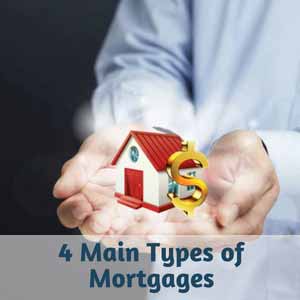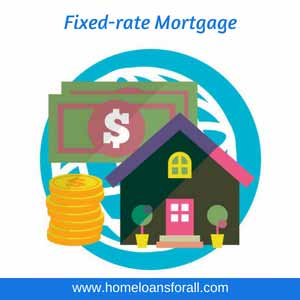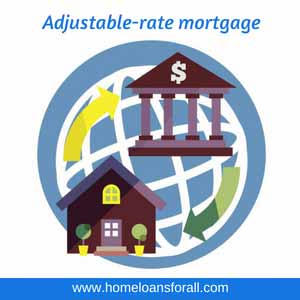Types of Mortgages Explained
 One of the commonly asked questions by new home buyers is “what are the various types of mortgages available in Canada?” If you have the same question in mind, then you have come to the right place for answers. As soon as you jump start on mortgage search, you will realize that the options are overwhelming and you might want to hire a professional broker to help you with the application process. Your goal is to choose the best which doesn’t necessarily mean the cheapest in the market. There are other factors that come into play besides the interest rate. To clear your doubts, start by understanding how home loans work and the different types available.
One of the commonly asked questions by new home buyers is “what are the various types of mortgages available in Canada?” If you have the same question in mind, then you have come to the right place for answers. As soon as you jump start on mortgage search, you will realize that the options are overwhelming and you might want to hire a professional broker to help you with the application process. Your goal is to choose the best which doesn’t necessarily mean the cheapest in the market. There are other factors that come into play besides the interest rate. To clear your doubts, start by understanding how home loans work and the different types available.
How Mortgages Work
There is a basic structure for a mortgage regardless of its nature. When you borrow money to buy a property, you must pay the cost (interest) plus the principal amount. That is the basic way in which these loans work. But at which point do they start to differ. Their differences arise due to a number of factors namely…
- The charges involved
- Interest rate
- How to repay
- Special Situations
- Loan terms
If you are already aware of the basic types of mortgages and want to proceed with the application process, you still need to know about the financing options and the current rates. Check out how much mortgage you can afford at Home Loans For All.
Here come the different forms of home loans.
1. Repayment mortgage
This is the simplest form of mortgage you could ever have. You have to pay a part of the money you have borrowed, in addition to some interest. The repayment period is normally 25 years in which you should clear the debt to own your home fully. If you move before the amortization, you might carry forward the mortgage i.e. porting the loan. Alternatively, you can pay off the balance and take a new mortgage. Maybe at the time of relocating, the price of your home has shot up. Given that you have repaid some capital, you might reap some profits. In your next mortgage, you can put down a bigger deposit and consequently find a better interest rate. Repayment mortgages are ideal for buyers who are sure to repay the full amount at the end of amortization.
2. Interest-only mortgage
 Like the name would lead you to believe, this is a type of loan whereby you only pay the interest every month. You repay the capital at the end of the amortization with funds you should have saved elsewhere. As you can see, it differs from the repayment mortgage in that you must provide sufficient money to cover the entire debt at the end of the mortgage journey. You might use your inheritance money or save in some ways. Either way, you must be sure that you will have the full amount at the end of amortization. If you fail to repay the full amount, your lender might foreclose your house. But you’ll be lucky if the home value has appreciated so that you can pay off the loan with the extra value.
Like the name would lead you to believe, this is a type of loan whereby you only pay the interest every month. You repay the capital at the end of the amortization with funds you should have saved elsewhere. As you can see, it differs from the repayment mortgage in that you must provide sufficient money to cover the entire debt at the end of the mortgage journey. You might use your inheritance money or save in some ways. Either way, you must be sure that you will have the full amount at the end of amortization. If you fail to repay the full amount, your lender might foreclose your house. But you’ll be lucky if the home value has appreciated so that you can pay off the loan with the extra value.
There is always a possibility of not repaying the mortgage in due time. For this reason, mortgage lenders require a proof that you actually plan to repay the loan before granting an interest-only mortgage. The greatest advantage if this type of mortgage is that you get to pay lower monthly installments than in other forms of loans. If you find it challenging to save a huge sum of money for repaying the principal at the end, you can switch to the other form of a repayment mortgage. An interest-only mortgage is ideal for buyers who cannot afford higher monthly repayments and are sure to save sufficient funds to settle the debt at the end of the loan term.
3. Fixed-rate mortgage
 Mortgages demand either a fixed or adjustable interest rate. They can also feature a combination of the two types of interest rates. Fixed rate mortgages have a constant rate of interest that runs throughout the repayment term, regardless of the market conditions. So, they call for same-size monthly payments until the term ends. If you see a loan advertised as a 3-year fix, know that it is a fixed-rate mortgage.
Mortgages demand either a fixed or adjustable interest rate. They can also feature a combination of the two types of interest rates. Fixed rate mortgages have a constant rate of interest that runs throughout the repayment term, regardless of the market conditions. So, they call for same-size monthly payments until the term ends. If you see a loan advertised as a 3-year fix, know that it is a fixed-rate mortgage.
The advantage of paying a fixed rate is that you can always plan your budget effectively. On the flip side, if the interest rates go down, you have nothing to gain. Note that fixed rate home loans are a bit higher than variable mortgages. If you want to close the deal faster, you should watch out for the charges. As the term comes to the end, you should look for other options before you are automatically enrolled in a variable rate that might be higher.
4. Adjustable-rate mortgage
This type of loan has a variable interest rate. It changes with market conditions. Basically, it starts at a fixed rate and switches to a variable rate. For example, a 5/1 mortgage has a fixed rate for the first five years but then changes after every year. Normally, the adjustable interest rate is lower than the fixed rate. But you cannot be sure of how it will look in years to come. It could increase or reduce later. It means you should keep some contingency funds to cover the loan when the rates hike.
There are different forms of adjustable mortgages namely;
 a. Standard variable mortgage
a. Standard variable mortgage
It comes with a normal interest rate that a lender charges. It changes only when you decide to take another deal. Economic interest rates might fluctuate and cause the mortgage rate to change as well. The good side of standard variable mortgage is that you can leave a deal any time or overpay.
b. Discount mortgage
Your lender can offer a discount on your standard rate mortgage. This discount is valid for a specific period of time say 2 or 3 years. Shop around to find such deals but be careful of loans that come with ridiculously higher discounts. You might pay a higher rate in the long run. The advantage of discounts is that they reduce your monthly installment burden but your lender could increase the interest rate any time. If you want to leave the discount mortgage before the term ends, find out if there are any charges you might incur.
Final Words
There are other types of mortgages we haven’t covered yet such as government-sponsored, conventional, tracker, capped-rate, and offset mortgages. Before choosing a mortgage, consider how long it takes to repay. The mortgage market is quite complex and if you need help, reach out to a mortgage consultant, adviser. Check out how much mortgage you can afford.











